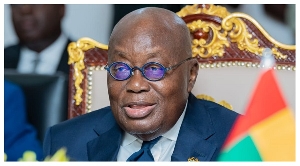- Home - News
- TWI News | TV
- Polls
- Year In Review
- News Archive
- Crime & Punishment
- Politics
- Regional
- Editorial
- Health
- Ghanaians Abroad
- Tabloid
- Africa
- Religion
- Election 2020
- Coronavirus
- News Videos | TV
- Photo Archives
- News Headlines
- Press Release
Business News of Friday, 5 March 1999
Source: --
Develop Major Ports into Hub Port Status -Salia
Accra (Greater Accra), 5 March, '99 -
Mr Edward Salia, Minister of Roads and Transport on Thursday asked West African states to develop their major ports instead of competing among themselves in building individual ports that end up being under utilised. "...Develop consensus on our major ports, which are likely to develop into hub port status, while the minor ones are made feeder port....". Mr Salia said this results in a scandalous waste of resources and is not a prudent line of action, recommending that, "the minor ones must be turned into feeder ports in order to save cost in the development of Maritime Transport in the region". Mr Salia was speaking at a Regional Workshop on Co- operation in the Field of Transport and Intra-Regional Trade Development at the Second ECOWAS Trade Fair in Accra. The workshop is meant to discuss the various means of transport in the sub-region and the laws and practices that are impeding smooth trade. Mr Salia said maritime laws and policies are yet to be harmonised for the pursuit of common objectives in the maritime industry. Mr Salia described the situation as bad, and said "all national shipping lines of West and Central Africa have collapsed due to past poor performance and lack of strategic regional planning and co-operation in shipping matters". "I strongly believe that if the national shipping lines in West and Central Africa had adopted pooling arrangements with adequate cargo consolidation for their ships, they would have survived the fierce competition from foreign lines". He said, "the only way forward for maritime business is for us to intensify our co-operative efforts in the area of maritime transport if we participate in the international shipping and carry a fair share of our international trade. "This explains why the rest of the world is dominated by regional blocks of co-operation in the maritime industry. And yet our attempts to establish a regional shipping line has not shown any promise", Mr Salia added. Mr Salia said the flexibility and convenience of road transport makes it the predominant transport mode in the sub-region. He said Article 32 of the ECOWAS treaty provides several things including the development of an extensive network of all-weather highways within the community, priority being given to the inter-state highways; and co-ordinate their positions in international negotiations in maritime transport. "To achieve these member states should undertake the establishment and promotion of joint ventures, community enterprises and the participation of the private sector in the areas of transport and communications". He blamed the problems derived from the Anglophone and Francophone divide; and religious considerations and called for quick rationalisation to make their activities worthwhile. He said he was disappointed that for nearly 30 years the desired level of co-operation within the Ministerial Conference of West and Central African States on Maritime Transport (MINCONMAR) had not materialised and called on member states to demonstrate their real commitment by action. Mr Salia said Ghana, under the Gateway Project, has reduced the number of official immigration, police and customs checkpoints on its Trans- West African routes. He said safety in the skies is of paramount importance and regretted that only four countries, namely Ghana, South Africa, Ethiopia and Morocco, qualify for the American Federal Aviation safety standards. Mr Salia called on member states to improve the safety of African airspace by co-operating with neighbouring countries to assist with oversight capabilities". Mr Mark Offei, deputy secretary general of ECOWAS, called on member countries to intensify their programmes and work at making the ideals of the founding fathers of ECOWAS a reality. He said the fair is dwelling on transport as an indication of the secretariat's commitment to move forward the institution.










